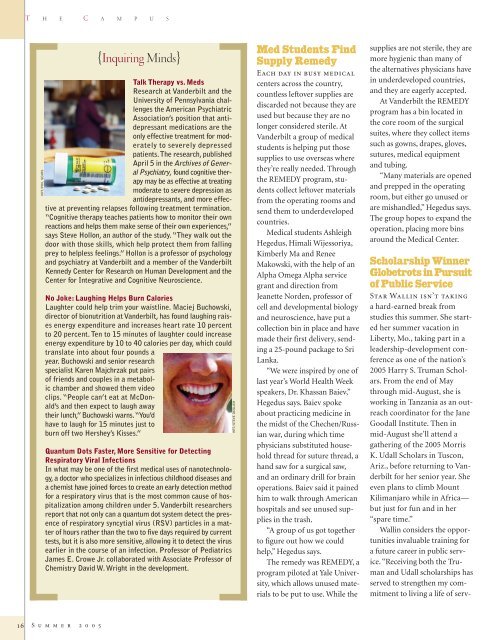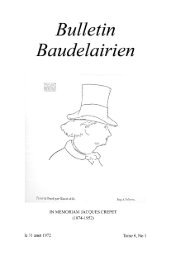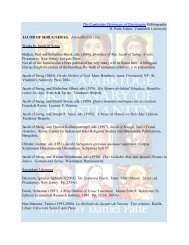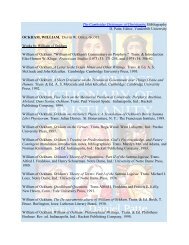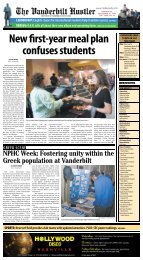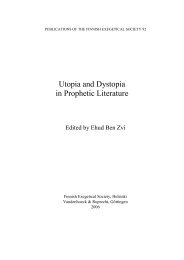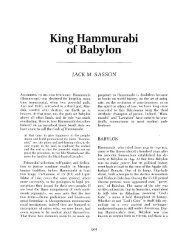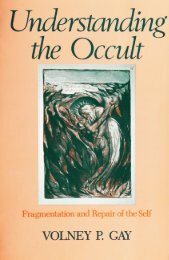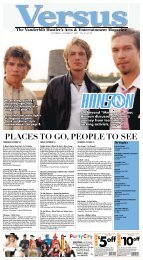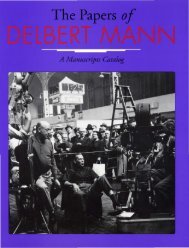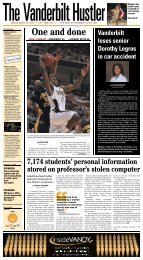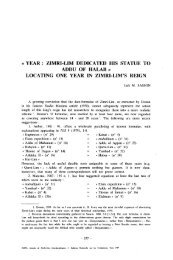From the Editor From the Reader - DiscoverArchive Home ...
From the Editor From the Reader - DiscoverArchive Home ...
From the Editor From the Reader - DiscoverArchive Home ...
You also want an ePaper? Increase the reach of your titles
YUMPU automatically turns print PDFs into web optimized ePapers that Google loves.
16<br />
T H E C A M P U S<br />
KRT/PHIL SEARS<br />
S u m m e r 2 0 0 5<br />
{Inquiring Minds}<br />
Talk Therapy vs. Meds<br />
Research at Vanderbilt and <strong>the</strong><br />
University of Pennsylvania challenges<br />
<strong>the</strong> American Psychiatric<br />
Association’s position that antidepressant<br />
medications are <strong>the</strong><br />
only effective treatment for moderately<br />
to severely depressed<br />
patients.The research, published<br />
April 5 in <strong>the</strong> Archives of General<br />
Psychiatry, found cognitive <strong>the</strong>rapy<br />
may be as effective at treating<br />
moderate to severe depression as<br />
antidepressants, and more effective<br />
at preventing relapses following treatment termination.<br />
“Cognitive <strong>the</strong>rapy teaches patients how to monitor <strong>the</strong>ir own<br />
reactions and helps <strong>the</strong>m make sense of <strong>the</strong>ir own experiences,”<br />
says Steve Hollon, an author of <strong>the</strong> study.“They walk out <strong>the</strong><br />
door with those skills, which help protect <strong>the</strong>m from falling<br />
prey to helpless feelings.” Hollon is a professor of psychology<br />
and psychiatry at Vanderbilt and a member of <strong>the</strong> Vanderbilt<br />
Kennedy Center for Research on Human Development and <strong>the</strong><br />
Center for Integrative and Cognitive Neuroscience.<br />
No Joke: Laughing Helps Burn Calories<br />
Laughter could help trim your waistline. Maciej Buchowski,<br />
director of bionutrition at Vanderbilt, has found laughing raises<br />
energy expenditure and increases heart rate 10 percent<br />
to 20 percent. Ten to 15 minutes of laughter could increase<br />
energy expenditure by 10 to 40 calories per day, which could<br />
translate into about four pounds a<br />
year. Buchowski and senior research<br />
specialist Karen Majchrzak put pairs<br />
of friends and couples in a metabolic<br />
chamber and showed <strong>the</strong>m video<br />
clips. “People can’t eat at McDonald’s<br />
and <strong>the</strong>n expect to laugh away<br />
<strong>the</strong>ir lunch,”Buchowski warns.“You’d<br />
have to laugh for 15 minutes just to<br />
burn off two Hershey’s Kisses.”<br />
Quantum Dots Faster, More Sensitive for Detecting<br />
Respiratory Viral Infections<br />
In what may be one of <strong>the</strong> first medical uses of nanotechnology,<br />
a doctor who specializes in infectious childhood diseases and<br />
a chemist have joined forces to create an early detection method<br />
for a respiratory virus that is <strong>the</strong> most common cause of hospitalization<br />
among children under 5. Vanderbilt researchers<br />
report that not only can a quantum dot system detect <strong>the</strong> presence<br />
of respiratory syncytial virus (RSV) particles in a matter<br />
of hours ra<strong>the</strong>r than <strong>the</strong> two to five days required by current<br />
tests, but it is also more sensitive, allowing it to detect <strong>the</strong> virus<br />
earlier in <strong>the</strong> course of an infection. Professor of Pediatrics<br />
James E. Crowe Jr. collaborated with Associate Professor of<br />
Chemistry David W. Wright in <strong>the</strong> development.<br />
KRT/STEVE DESLICH<br />
Med Students Find<br />
Supply Remedy<br />
Each day in busy medical<br />
centers across <strong>the</strong> country,<br />
countless leftover supplies are<br />
discarded not because <strong>the</strong>y are<br />
used but because <strong>the</strong>y are no<br />
longer considered sterile. At<br />
Vanderbilt a group of medical<br />
students is helping put those<br />
supplies to use overseas where<br />
<strong>the</strong>y’re really needed. Through<br />
<strong>the</strong> REMEDY program, students<br />
collect leftover materials<br />
from <strong>the</strong> operating rooms and<br />
send <strong>the</strong>m to underdeveloped<br />
countries.<br />
Medical students Ashleigh<br />
Hegedus, Himali Wijessoriya,<br />
Kimberly Ma and Renee<br />
Makowski, with <strong>the</strong> help of an<br />
Alpha Omega Alpha service<br />
grant and direction from<br />
Jeanette Norden, professor of<br />
cell and developmental biology<br />
and neuroscience, have put a<br />
collection bin in place and have<br />
made <strong>the</strong>ir first delivery, sending<br />
a 25-pound package to Sri<br />
Lanka.<br />
“We were inspired by one of<br />
last year’s World Health Week<br />
speakers, Dr. Khassan Baiev,”<br />
Hegedus says. Baiev spoke<br />
about practicing medicine in<br />
<strong>the</strong> midst of <strong>the</strong> Chechen/Russian<br />
war, during which time<br />
physicians substituted household<br />
thread for suture thread, a<br />
hand saw for a surgical saw,<br />
and an ordinary drill for brain<br />
operations. Baiev said it pained<br />
him to walk through American<br />
hospitals and see unused supplies<br />
in <strong>the</strong> trash.<br />
“A group of us got toge<strong>the</strong>r<br />
to figure out how we could<br />
help,” Hegedus says.<br />
The remedy was REMEDY, a<br />
program piloted at Yale University,<br />
which allows unused materials<br />
to be put to use. While <strong>the</strong><br />
supplies are not sterile, <strong>the</strong>y are<br />
more hygienic than many of<br />
<strong>the</strong> alternatives physicians have<br />
in underdeveloped countries,<br />
and <strong>the</strong>y are eagerly accepted.<br />
At Vanderbilt <strong>the</strong> REMEDY<br />
program has a bin located in<br />
<strong>the</strong> core room of <strong>the</strong> surgical<br />
suites, where <strong>the</strong>y collect items<br />
such as gowns, drapes, gloves,<br />
sutures, medical equipment<br />
and tubing.<br />
“Many materials are opened<br />
and prepped in <strong>the</strong> operating<br />
room, but ei<strong>the</strong>r go unused or<br />
are mishandled,” Hegedus says.<br />
The group hopes to expand <strong>the</strong><br />
operation, placing more bins<br />
around <strong>the</strong> Medical Center.<br />
Scholarship Winner<br />
Globetrots in Pursuit<br />
of Public Service<br />
Star Wallin isn’t taking<br />
a hard-earned break from<br />
studies this summer. She started<br />
her summer vacation in<br />
Liberty, Mo., taking part in a<br />
leadership-development conference<br />
as one of <strong>the</strong> nation’s<br />
2005 Harry S. Truman Scholars.<br />
<strong>From</strong> <strong>the</strong> end of May<br />
through mid-August, she is<br />
working in Tanzania as an outreach<br />
coordinator for <strong>the</strong> Jane<br />
Goodall Institute. Then in<br />
mid-August she’ll attend a<br />
ga<strong>the</strong>ring of <strong>the</strong> 2005 Morris<br />
K. Udall Scholars in Tuscon,<br />
Ariz., before returning to Vanderbilt<br />
for her senior year. She<br />
even plans to climb Mount<br />
Kilimanjaro while in Africa—<br />
but just for fun and in her<br />
“spare time.”<br />
Wallin considers <strong>the</strong> opportunities<br />
invaluable training for<br />
a future career in public service.<br />
“Receiving both <strong>the</strong> Truman<br />
and Udall scholarships has<br />
served to streng<strong>the</strong>n my commitment<br />
to living a life of serv-


